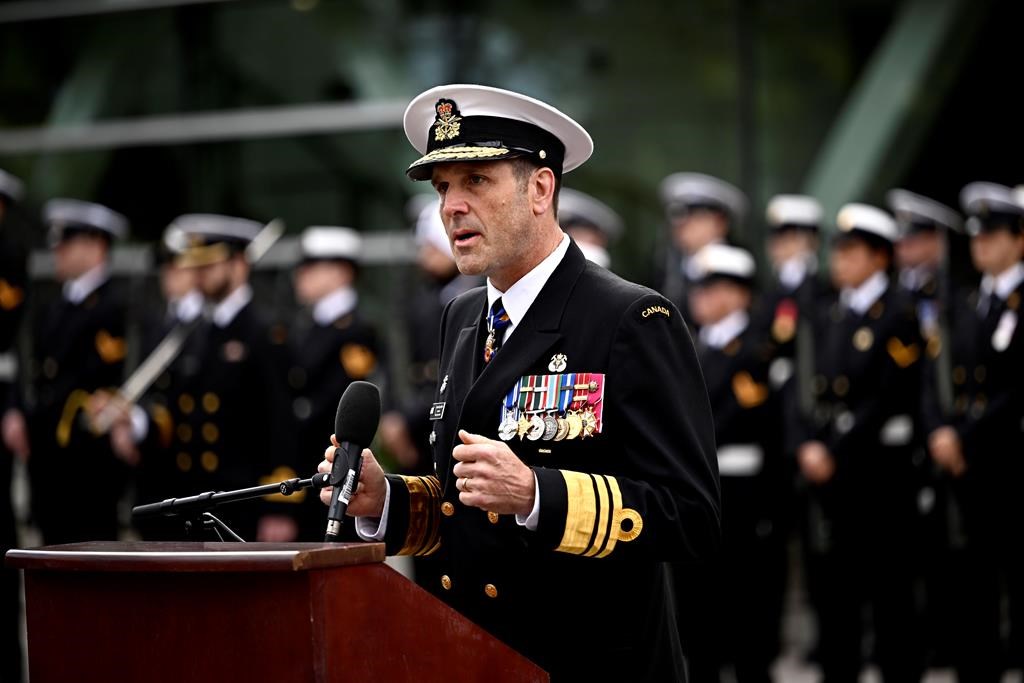Even with personnel shortages, Vice-Admiral Angus Topshee is “confident” in the Royal Canadian Navy’s ability to meet its commitments.

“The biggest challenge we face right now is personnel. So, we’re about 20 per cent short overall in the Navy,” the Navy’s commander said in an interview with The West Block host Mercedes Stephenson.
“Some of the areas we’re particularly short — (like) maritime technicians, who are people that we require to be able to sail the ships — they’re the ones that operate the plant, that make the engines run, make the ship have power and heat and everything else that needs to be able to operate at sea.”
The vice-admiral waned the Navy was in a “critical state” at the end of November when he released a video called “The State of the Royal Canadian Navy,” highlighting the fact that recruitment challenges being faced across the Canadian Armed Forces (CAF) hinder operational readiness.
In the video, he says their attrition rate for these maritime technicians is one exiting every two days.
“So, we have just enough to get by and we’re growing them as quickly as we can. But even if I recruited every person in Canada who is willing to join the Navy (it) would take us five to 10 years to train them all to the level that we require,” Topshee told Stephenson.
“Which is one of the reasons that we put the video out. The video internally was meant to be a call to action to really make it clear that we need to take a look at all of our human resources issues, how we manage our establishment, how we divide up our occupations and all the functions on the ship.”

Despite being short on crew, Topshee says that the Navy can maintain its operational commitments, including deploying three ships as part of the Indo-Pacific Strategy and Operation Reassurance, but there is little room for things to go wrong.
“There’s a number of different commitments we have to protect Canada and Canada’s maritime interests and I’m confident that we will continue to execute all those requirements. But there is a chance if things don’t go well, that we won’t be able to meet those,” Topshee said.
In a recent statement , Defence Minister Bill Blair’s spokesperson, Daniel Minden, said that the minister agrees with Topshee’s assessment that the CAF and Navy are facing challenges and echoes Topshee’s confidence in finding ways through this.
“We are making significant new investments in the Royal Canadian Navy to help it meet tomorrow’s challenges. We are investing in six new Arctic and Offshore Patrol ships – four of which have already been delivered. As the Admiral outlined, these are significantly boosting our naval capabilities,” Minden wrote.
“We are also investing in two Joint Support Ships and a new fleet of 15 Canadian Surface Combatants built here in Canada. This will be the largest Canadian shipbuilding initiative since World War II. This project is expected to create and maintain 10,000 jobs over 25 years – and provide the RCN with modern, state of the art ships built in Canada so that we can continue to meet our international commitments.”
Minden then pointed to an announcement Blair made last month in Halifax, concerning plans to build a $188 million new naval training centre to complement shipbuilding commitments.

More programs have also been introduced in an attempt to help bolster ranks in the Navy. Permanent residents are now eligible to enrol in the CAF and in March the Navy Experience Program was launched.
This program allows individuals to sign a one-year contract to try out a variety of naval trades before opting into a career path or deciding service is not for them.
While Topshee is confident in the Navy’s ability to meet the challenges ahead, more ships means more staff are still needed.
“So, in terms of the delivery of the future fleet, a lot is happening next year,” he said. “The challenge is it takes time to get all of those ships into service and we need the sailors to operate them.”




Comments